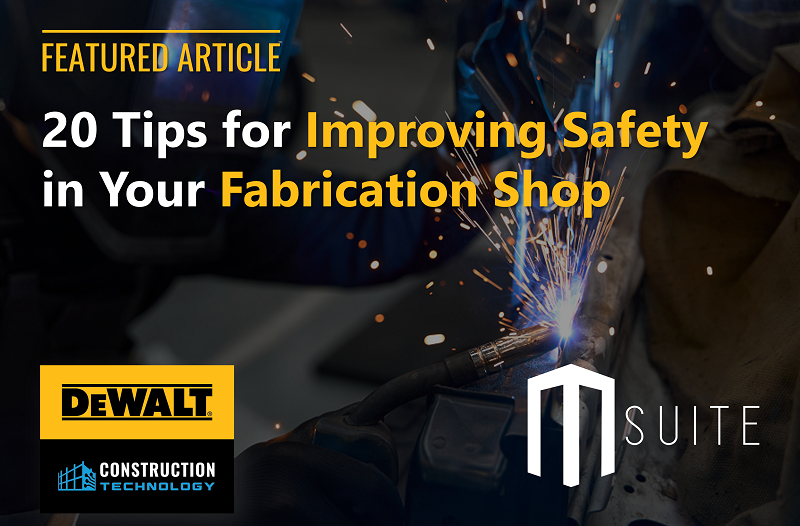Prefabrication, also known as modular or off-site construction, is an innovative method of building that involves constructing components off-site in a controlled environment and transporting components to the construction jobsite for assembly. This approach is helping to transform the construction industry, offering many benefits. Below are 20 tips for improving safety in your Fabrication shop.
Prefabrication Benefits & Industry Transformation
Prefabrication can improve safety by reducing workers’ time on-site. As a result, workers can construct building components in a controlled environment, reducing the risk of accidents and injuries on-site. It also significantly reduces the construction timeline since components are built off-site simultaneously while the jobsite is being prepared.
Since prefabrication takes place in a controlled environment, it allows for better quality control over building components, resulting in fewer errors and defects, and improving overall building quality.
Prefabrication reduces waste by using precise measurements and pre-determined building materials. This also helps to make the construction process more sustainable.
Prefabrication can result in cost savings due to reduced labor and material costs. The controlled prefabrication environment can also help reduce the rework needed on the jobsite.
Today’s prefabrication allows for greater design flexibility and customization since building components can be manufactured off-site to exact specifications resulting in unique and innovative building designs that would not be possible using traditional construction methods.
Overall, prefabrication is helping to revolutionize the construction industry by improving efficiency, quality, safety, sustainability, and flexibility in design.
Your 20-Tip Check List for your Fabrication Shop:
- Provide safety training to all employees regularly.
- Ensure that all employees wear appropriate personal protective equipment (PPE).
- Post safety signs and reminders throughout the shop.
- Conduct regular safety inspections of the shop and equipment.
- Develop a safety plan and communicate it to all employees.
- Use proper lifting techniques to avoid injuries.
- Ensure that all equipment is appropriately maintained and in good working condition.
- Use lockout/tagout procedures when performing maintenance on equipment.
- Keep the shop clean and free of clutter to avoid accidents.
- Use proper lighting to ensure that employees can see what they are doing.
- Use adequate ventilation to avoid exposure to fumes and dust.
- Have a designated area for storing hazardous materials.
- Use safety guards on equipment to prevent accidents.
- Encourage employees to report safety concerns or hazards.
- Use safety protocols when handling sharp or heavy objects.
- Provide first aid kits and fire extinguishers throughout the shop.
- Encourage employees to take breaks to avoid fatigue.
- Develop a safety committee to address safety concerns and make improvements.
- Use safety protocols when using electrical equipment.
- Provide regular safety reminders and training to employees to maintain a safety culture in the workplace.
Safety is of paramount importance in the fabrication shop because of the various hazards and risks that exist in this type of work environment. Fabrication work often involves the use of heavy machinery, sharp tools, and hazardous materials, which can lead to serious injuries or accidents if proper safety protocols are not followed. Here are some reasons why safety is important in the fabrication shop:
Protects employees: A safe work environment protects employees from injuries, accidents, and illnesses that could result from working with hazardous materials and equipment.
Reduces costs: Injuries or accidents in the fabrication shop can result in high medical bills, workers’ compensation claims, and lost productivity, which can be costly to both your employee and the business.
Boosts productivity: A safe work environment can help boost productivity because employees feel more comfortable and confident in their work environment, and they can focus on their work without worrying about safety concerns.
Enhances the company’s reputation: A safe work environment can help enhance the company’s reputation and promote a positive image to customers, stakeholders, and employees.
Legal compliance: Safety regulations are enforced by governing bodies, and non-compliance can result in fines and legal action against the company. Ensuring safety compliance can help protect the company from legal and financial liabilities.
Conclusion
In summary, safety is important in the fabrication shop to protect employees, reduce costs, enhance productivity, promote a positive image, and comply with safety regulations. A safe work environment is essential to the success of your construction business and the well-being of the employees.







